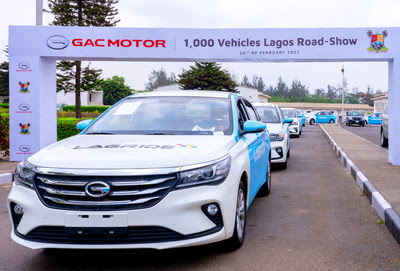GUANGZHOU, China, Feb. 26, 2022 /PRNewswire/ — On February 20, 2022, an awe-inspiring parade of 1000 GAC MOTOR vehicles crossed the Third Mainland Bridge into Lagos State, ready to begin service for the LAGRIDE public transport project.

The project, which features a large-scale government-sponsored ride-hailing platform, is the first of its kind instigated by the current Lagos government.
GAC MOTOR’s years of establishing a foothold in the local automobile market have paid off. It has been trusted to provide 1000 vehicles in the project.
Design, Comfort, Quality
As a designated supplier, GAC MOTOR has equipped Lagos with 1000 GS3s and GA4s.
In recent days, a thousand cars have appeared in a visually striking and enormous “roadshow” across the Third Mainland Bridge linking Lagos state to the Nigerian mainland.
The GS3 SUV and GA4 sedan feature intelligent Chinese technology capabilities, reliable quality of materials, and a design that prioritizes comfort. Both have spacious cabins that make them well-suited to extensive use by the public while maintaining a feeling of cutting-edge design and luxury.
Affordable Vehicles Will Boost Transport Business
LAGRIDE is a vital opportunity for GAC MOTOR to build an even stronger reputation through simple visibility and a more profound commitment to local economic development.
The project is designed to boost Nigeria’s public transport services, promote the development of the online ride-hailing sector, assist the Nigerian government in building a world-class online ride-hailing platform, and reform Nigeria’s transportation sector.
LAGRIDE is also a scheme of empowerment for Lagos residents. It will provide a thousand new passenger cars for purchase by eligible unemployed and taxi drivers equipped with perfect safety and insurance systems.
The cars also come with low initial deposits and long repayment periods, which reduce the employment threshold, provide employment opportunities, and reduce pressures associated with car purchases, promoting consumption and aiding overall economic development.
A Clear Commitment to Development in Nigeria
GAC MOTOR, as a brand, has been working to cultivate the Nigerian market for years and has committed to bringing ingenious design, superior quality, and advanced technology to the Nigerian people.
In 2021, GAC MOTOR won Nigeria’s prestigious “Automobile Company of the Year” award. The GS8 also won “Most Desirable SUV.”
The future looks bright for GAC MOTOR. Expect many more years of entrenched development in Nigeria and the broader African continent for the Chinese carmaker.
Photo – https://mma.prnewswire.com/
